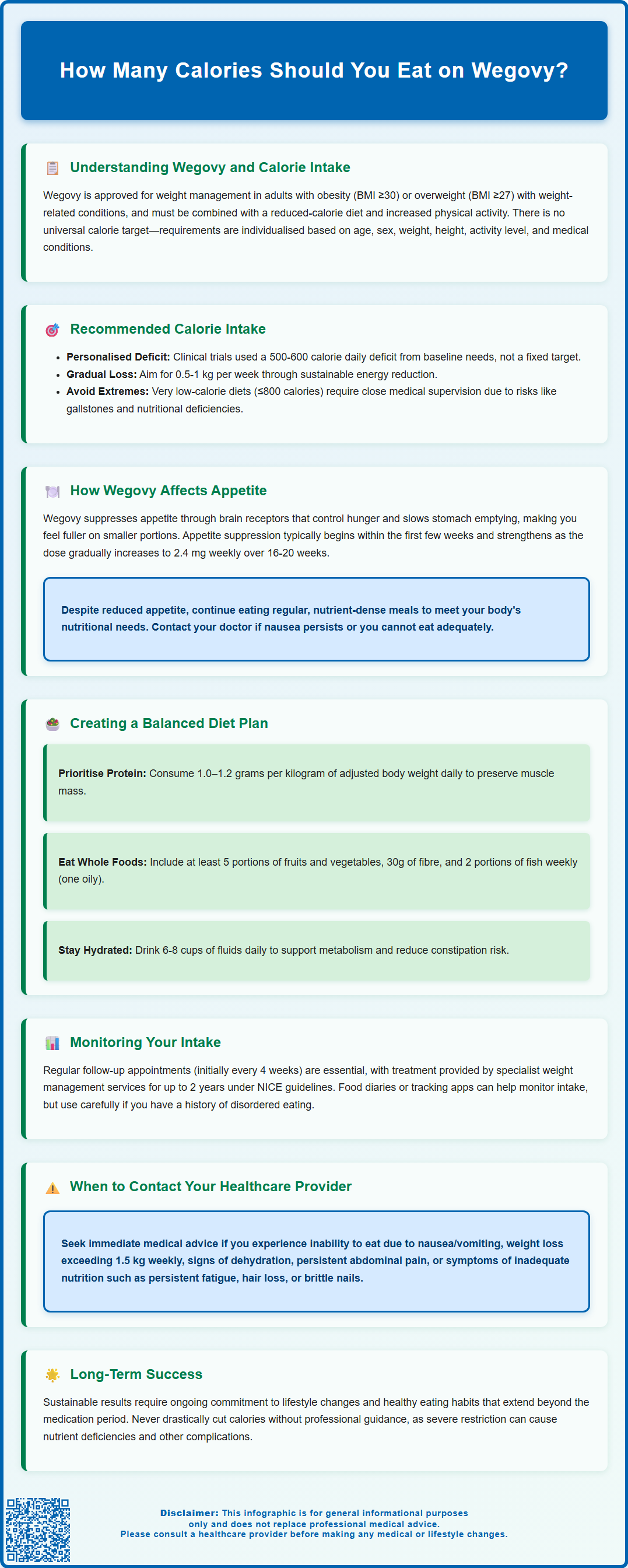How many calories should you consume on Wegovy? Wegovy (semaglutide 2.4 mg) is a GLP-1 receptor agonist licensed by the MHRA for weight management in adults with obesity or overweight with comorbidities. Whilst Wegovy significantly reduces appetite and supports weight loss, there is no universal calorie target for all patients. Calorie requirements are highly individualised, depending on age, sex, weight, height, activity level, and medical conditions. Clinical trials typically implemented a 500–600 kcal daily deficit from baseline requirements, combined with increased physical activity. NICE guidance recommends Wegovy as part of specialist weight management services, emphasising a multicomponent approach including behavioural change, dietary advice, and sustainable calorie reduction tailored to individual needs.
Summary: There is no single prescribed calorie target for Wegovy; requirements are individualised, but clinical trials typically used a 500–600 kcal daily deficit from baseline energy needs.
- Wegovy (semaglutide 2.4 mg) is a GLP-1 receptor agonist licensed by the MHRA for weight management in adults with obesity or overweight with comorbidities.
- The medication works by reducing appetite through central nervous system pathways and delaying gastric emptying, making adherence to reduced-calorie diets easier.
- NICE recommends Wegovy as part of specialist weight management services for up to 2 years, combined with behavioural change, dietary modification, and physical activity.
- Calorie targets should be determined by healthcare professionals using validated equations and individualised based on age, sex, weight, activity level, and medical conditions.
- Patients should maintain adequate nutrition with focus on protein (1.0–1.2 g/kg daily), fibre, and nutrient-dense foods whilst avoiding severe calorie restriction without medical supervision.
- Regular monitoring for nutritional adequacy, gastrointestinal side effects, and treatment response is essential, with prompt reporting of severe nausea, dehydration, or abdominal pain to healthcare providers.
Table of Contents
Understanding Wegovy and Calorie Intake
Wegovy (semaglutide 2.4 mg) is a glucagon-like peptide-1 (GLP-1) receptor agonist licensed by the MHRA for weight management in adults with obesity (BMI ≥30 kg/m²) or overweight (BMI ≥27 kg/m²) with at least one weight-related comorbidity. Lower BMI thresholds may apply for people from some minority ethnic groups. Whilst Wegovy is an effective pharmacological intervention, it is not a standalone solution and must be used alongside a reduced-calorie diet and increased physical activity to achieve optimal outcomes.
There is no single prescribed calorie target that applies universally to all patients taking Wegovy. Calorie requirements are highly individualised and depend on multiple factors including age, sex, baseline weight, height, activity level, metabolic rate, and existing medical conditions. The medication works by mimicking the action of endogenous GLP-1, which regulates appetite and food intake, but it does not eliminate the need for dietary modification.
According to NICE guidance (TA875), Wegovy is recommended as part of specialist weight management services for a maximum treatment duration of 2 years. Weight management interventions should include a multicomponent approach combining behavioural change, dietary advice, and physical activity. While professional guidance on calorie targets is valuable, patients should work with healthcare professionals to develop an appropriate and sustainable eating plan.
It is essential to understand that calorie reduction should be sustainable and nutritionally adequate. Crash diets or severe calorie restriction are not recommended and may compromise treatment efficacy. Healthcare professionals typically calculate individual energy requirements using validated equations and adjust recommendations based on treatment response and tolerability.
Wegovy is not recommended during pregnancy or breastfeeding. Women of childbearing potential should use effective contraception and discuss family planning with their healthcare provider before starting treatment.

Recommended Calorie Intake While Taking Wegovy
Most clinical trials evaluating Wegovy, including the pivotal STEP programme, implemented a reduced-calorie diet of approximately 500-600 kcal deficit per day from baseline energy requirements, combined with increased physical activity (at least 150 minutes per week of moderate-intensity activity, in line with UK Chief Medical Officers' guidelines).
Rather than following rigid calorie targets, the recommended approach is to create a personalised energy deficit based on your estimated daily energy requirements. Healthcare professionals can calculate this using validated equations (such as the Henry equation used in UK practice) and clinical judgement, taking into account your individual circumstances.
The focus should be on creating a sustainable energy deficit that promotes gradual weight loss (typically 0.5-1 kg per week) whilst preserving lean body mass and ensuring adequate nutrition. This individualised approach is more effective than following generic calorie ranges, as requirements vary considerably based on factors such as height, weight, age, sex, and activity level.
NICE recommends that calorie targets should be determined through comprehensive assessment by appropriately trained healthcare professionals, ideally including dietitians or specialist weight management practitioners. Regular review appointments will help ensure your calorie intake remains appropriate as your weight changes.
It is important to note that very low-calorie diets (≤800 kcal per day) should only be undertaken under close medical supervision as part of structured programmes with specific time limits. These carry risks including gallstone formation, electrolyte disturbances, and nutritional deficiencies. Patients taking Wegovy should never drastically reduce calories without professional guidance, as the medication itself significantly reduces appetite, and combining this with severe restriction may lead to inadequate nutrient intake and adverse effects such as fatigue, dizziness, or hair loss (which can occur with rapid weight loss).
How Wegovy Affects Appetite and Food Consumption
Wegovy exerts its weight loss effects primarily through central appetite regulation and delayed gastric emptying. As a GLP-1 receptor agonist, semaglutide acts on receptors in the hypothalamus and brainstem areas that control satiety and food reward pathways. This mechanism leads to reduced hunger, increased feelings of fullness, and decreased food cravings, making it easier for patients to adhere to a reduced-calorie diet.
Patients commonly report significant appetite suppression within the first few weeks of treatment, though the effect typically becomes more pronounced as the dose is gradually escalated over 16–20 weeks to the maintenance dose of 2.4 mg weekly. Many individuals find they feel satisfied with smaller portion sizes and experience reduced interest in high-calorie, palatable foods. Some patients describe a fundamental change in their relationship with food, with diminished food-related thoughts and preoccupations.
The medication also slows gastric emptying, which prolongs the sensation of fullness after eating. This physiological effect means that patients may feel uncomfortably full if they consume their previous portion sizes. Common gastrointestinal adverse effects include nausea (reported in approximately 44% of patients in clinical trials), vomiting, diarrhoea, and constipation, particularly during dose escalation. These effects are generally transient and can be minimised by eating smaller, more frequent meals and avoiding high-fat foods.
Maintaining adequate hydration (6-8 glasses of fluid daily) is particularly important when experiencing gastrointestinal side effects to prevent dehydration. People with type 2 diabetes who take insulin or sulfonylureas should be aware of an increased risk of hypoglycaemia and may need their diabetes medication adjusted.
It is crucial that patients do not ignore hunger signals entirely or skip meals regularly, as this may lead to inadequate nutrition. Whilst Wegovy reduces appetite, the body still requires essential nutrients, vitamins, and minerals. Healthcare professionals should counsel patients to focus on nutrient-dense foods and maintain regular eating patterns, even when appetite is suppressed. If patients experience persistent nausea or inability to maintain adequate oral intake, they should contact their prescribing clinician, as dose adjustment may be necessary.
Creating a Balanced Diet Plan with Wegovy
A nutritionally balanced, reduced-calorie diet is fundamental to successful weight management with Wegovy. The diet should emphasise whole foods, adequate protein, fibre-rich carbohydrates, healthy fats, and abundant vegetables whilst limiting foods high in fat, salt and sugar. This approach ensures patients receive essential nutrients whilst creating the energy deficit necessary for weight loss.
Protein intake is particularly important during weight loss to preserve lean muscle mass. Patients should aim for approximately 1.0–1.2 g of protein per kilogram of adjusted body weight daily, distributed across meals. Good sources include lean meats, fish, eggs, legumes, low-fat dairy products, and plant-based alternatives. Adequate protein also enhances satiety, which complements Wegovy's appetite-suppressing effects.
Dietary composition should follow evidence-based principles aligned with the NHS Eatwell Guide recommendations:
-
Vegetables and fruits: At least 5 portions daily, providing essential vitamins, minerals, and fibre
-
Whole grains: Brown rice, wholemeal bread, oats, and whole grain pasta for sustained energy and digestive health
-
Lean proteins: Include at least 2 portions of fish per week, one of which should be oily fish, along with poultry, pulses, and plant-based proteins
-
Healthy fats: Small amounts of unsaturated fats from olive oil, nuts, seeds, and avocados
-
Hydration: Adequate fluid intake (6-8 cups or glasses daily, more if active or in hot weather) to support metabolism and reduce constipation risk
-
Fibre: Aim for around 30g of fibre per day from a variety of sources
Patients should limit foods high in fat, salt and sugar, sugary beverages, and excessive alcohol, as these provide calories with minimal nutritional value. Given the gastrointestinal effects of Wegovy, many patients find that rich, fatty, or heavily spiced foods exacerbate nausea.
Working with a registered dietitian is highly beneficial, particularly for patients with complex nutritional needs, food intolerances, or comorbidities such as diabetes or cardiovascular disease. Dietitians can provide personalised meal plans, address nutritional deficiencies, and offer practical strategies for managing side effects through dietary modification.
Monitoring Your Calorie Intake During Wegovy Treatment
Regular monitoring of dietary intake, weight, and overall health status is essential throughout Wegovy treatment. Patients should attend scheduled follow-up appointments with their healthcare team, with reviews typically aligned with dose escalation (every 4 weeks initially) and then individualised. According to NICE TA875, Wegovy treatment is provided within specialist weight management services and is limited to a maximum of 2 years.
Food diaries or tracking applications can be valuable tools for monitoring calorie and nutrient intake, helping patients maintain awareness of eating patterns and identify areas for improvement. However, tracking should be used judiciously, as obsessive calorie counting may be counterproductive for some individuals, particularly those with a history of disordered eating. Healthcare professionals should assess whether tracking is appropriate for each patient.
Patients should be alert to signs of inadequate nutrition, including persistent fatigue, hair loss, brittle nails, poor wound healing, or frequent infections. These may indicate insufficient calorie or protein intake, or specific micronutrient deficiencies. Blood tests may be considered if clinically indicated by symptoms or dietary insufficiency, particularly for nutrients such as vitamin B12, vitamin D, iron, and folate.
When to contact your healthcare provider:
-
Inability to maintain adequate oral intake due to severe nausea or vomiting
-
Unintentional weight loss exceeding 1.5 kg per week consistently
-
Signs of dehydration (dark urine, dizziness, reduced urination)
-
Persistent abdominal pain, particularly if severe or accompanied by fever
-
Symptoms of gallstones (right upper abdominal pain, especially after eating)
-
Signs of pancreatitis (severe upper abdominal pain radiating to the back) – seek urgent medical attention via NHS 111 or 999 if severe
-
Any concerns about nutritional adequacy or eating patterns
-
If you experience hypoglycaemia (if you have diabetes and take insulin or sulfonylureas)
Patients should report suspected side effects via the MHRA Yellow Card scheme (yellowcard.mhra.gov.uk).
Patients should remember that Wegovy is a long-term treatment requiring ongoing commitment to lifestyle modification. Sustainable weight management depends on establishing healthy eating habits that can be maintained beyond the medication period. Regular engagement with healthcare professionals ensures that calorie intake remains appropriate, nutritional needs are met, and any complications are identified and managed promptly.
Frequently Asked Questions
Is there a specific calorie limit I must follow whilst taking Wegovy?
No, there is no universal calorie limit for Wegovy. Healthcare professionals calculate individualised calorie targets based on your age, sex, weight, height, activity level, and medical conditions, typically creating a 500–600 kcal daily deficit from your baseline energy requirements.
Can I follow a very low-calorie diet whilst on Wegovy?
Very low-calorie diets (≤800 kcal daily) should only be undertaken under close medical supervision as part of structured programmes. Combining Wegovy's appetite suppression with severe calorie restriction without professional guidance may lead to inadequate nutrition, fatigue, and other adverse effects.
How does Wegovy affect my appetite and food intake?
Wegovy reduces appetite by acting on brain receptors that control satiety and slows gastric emptying, leading to increased fullness and reduced hunger. Most patients experience significant appetite suppression, making it easier to adhere to a reduced-calorie diet, though gastrointestinal side effects like nausea may occur initially.
The health-related content published on this site is based on credible scientific sources and is periodically reviewed to ensure accuracy and relevance. Although we aim to reflect the most current medical knowledge, the material is meant for general education and awareness only.
The information on this site is not a substitute for professional medical advice. For any health concerns, please speak with a qualified medical professional. By using this information, you acknowledge responsibility for any decisions made and understand we are not liable for any consequences that may result.
Heading 1
Heading 2
Heading 3
Heading 4
Heading 5
Heading 6
Lorem ipsum dolor sit amet, consectetur adipiscing elit, sed do eiusmod tempor incididunt ut labore et dolore magna aliqua. Ut enim ad minim veniam, quis nostrud exercitation ullamco laboris nisi ut aliquip ex ea commodo consequat. Duis aute irure dolor in reprehenderit in voluptate velit esse cillum dolore eu fugiat nulla pariatur.
Block quote
Ordered list
- Item 1
- Item 2
- Item 3
Unordered list
- Item A
- Item B
- Item C
Bold text
Emphasis
Superscript
Subscript










